Don't wanna be here? Send us removal request.
Photo
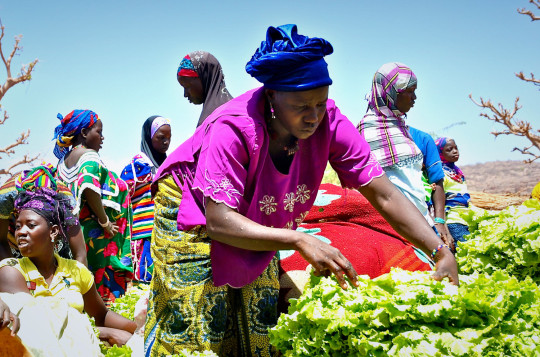
Illustration Photo: Salad traders in Garoule market (credits: © Irina Mosel / ODI / Flickr Creative Commons Attribution-NonCommercial 2.0 Generic (CC BY-NC 2.0))
LFS Grants to support projects in Africa and Iraq, Jordan, Lebanon, Palestine and Yemen
Objectives
Eliminate violence against women and girls & sustain respect for women’s bodily integrity and autonomy
Build women’s knowledge and agency around their right to bodily integrity, autonomy and freedom from violence Increase public support for ending violence against women in all forms Facilitate the passage and implementation of laws and policies that will help prevent and respond to different forms of VAW Strengthen the evidence base around needs, methods and effective approaches - Protect full economic rights and justice for women Promote women’s labour and economic rights Support women’s organising in formal and informal economies Build knowledge and support among key stakeholders and influencers for the recognition of women’s economic contributions and rights Facilitate the passage of better policies and laws to protect women’s economic rights such as decent work, food security and land and property rights Expand democratic space; sustain inclusive governance and equal political participation of women
Help increase the participation of diverse women in policy and decision-making processes at all levels and in diverse settings Create uninhibited operating space for women’s rights organisations and defenders Ensure stronger and better implementation of laws and policies regarding women’s political rights and participation Strengthen the evidence base around needs, methods and effective approaches
AWDF will be awarding grants under the Leading from the South (LFS) Initiative. LFS grants are to support projects in Africa and Iraq, Jordan, Lebanon, Palestine and Yemen. Under this call, we will be prioritising applications for work in Iraq, Jordan, Lebanon, Palestine or Yemen, the Horn of Africa, the Sahel Region, and French speaking Africa from women led organisations led by young women, LBTQI and non-binary people, women living with disabilities and other minoritised groups. The focus of the work in applications for LFS funding should be advocacy, though we will consider costs for service delivery if they represent less than 20% of your total application budget to AWDF.
You can apply for up to 50% of your verified 2021 income. For example, if your confirmed income for 2021 was USD80,000 you can apply for a maximum of up to USD40,000 per year. If your confirmed income for 2021 was $40,000, you can apply for a maximum of up to $10,000.
We have three types of grants – you can only submit one application to this call for proposals:
Pamoja: you can apply for a maximum of US$500,000 per annum for 2 years Ananse: you can apply for a maximum of US$200,000 per annum for 2 years Yalla: you can apply for a maximum of US$50,000 per annum for up to 3 years
Application Deadline: 12pm GMT on July 19th 2022
Check more https://adalidda.com/posts/Ez8AHPuT468gHWpYq/lfs-grants-to-support-projects-in-africa-and-iraq-jordan/call
0 notes
Photo

Illustration Photo: Drone monitoring of a pilot farm in Yangambi - Congo DRC (credits: Axel Fassio/CIFOR / Flickr Creative Commons Attribution-NonCommercial-NoDerivs 2.0 Generic (CC BY-NC-ND 2.0))
Hello Tomorrow Challenge - Food & Agriculture
The Global Challenge is a renowned international startup competition organized by Hello Tomorrow since 2014. It is uniquely designed to address the needs of early-stage deep tech startups across all industries.
The Challenge gives deep tech and science-based entrepreneurs around the globe a platform for their projects, providing opportunities for equity-free funding, global visibility and connections with key players in the deep tech ecosystem. To date, previous winners and finalists have already raised more than $2 billion in funding.
Track: Food & Agriculture
Feeding the Earth’s population while protecting our planet
Precision agriculture Mobilizing sensors, drones and information services to monitor, understand, and act on crops Empowering farmers for resources management Improved crops and farming Substituting/reducing the use of pesticides and other hazardous chemicals Reducing GHG emissions through carbon sequestration and nitrogen management Improving soil health and overall biodiversity Engineering crops for improved yield, pest resistance, and nutritional value Increasing livestock productivity sustainably Using sensors and automated devices for herd monitoring Developing novel animal feed for better health and yield Alternative food production Developing new ingredients to leverage in human foods and diets (alternative proteins, functional foods…) Developing modern ways of production with reduced carbon footprint (cellular agriculture, microbial cell factories…) Food safety & supply chain Improving food production, processing, distribution and quality Limiting and upcycling waste Ensuring transparency and traceability throughout the supply chain
Eligibility
We welcome startups that:
Are in the early-stage of development (from not yet incorporated startups up to series A or early commercialization stage) Are based on a new technology, a scientific discovery or a complex engineering process. Have a scientific validation of their claim, a proof of concept, a prototype, or are in the process of producing one. Have a team of at least 2 people. Are not a subsidiary or spin-off of an existing company. Foresee an economically viable application on the market within 15 years. Have the potential to have a strong impact on the industry targeted, and on society or the environment in general.
Application Deadline: 23rd September 2022
Check more https://adalidda.com/posts/N6HK7fW3SeY3KwzRe/hello-tomorrow-challenge-food-and-agriculture/call
0 notes
Photo
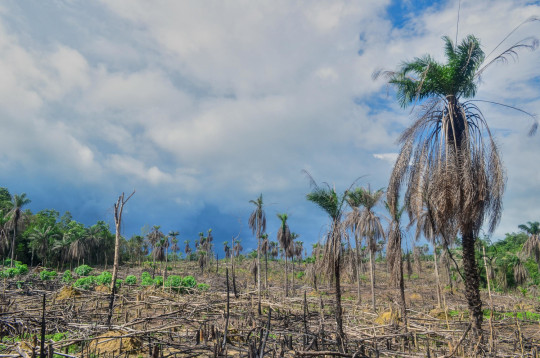
Illustration Photo: Deforestation in Sierra Leone (credits: jbdodane / Flickr Creative Commons Attribution-NonCommercial 2.0 Generic (CC BY-NC 2.0))
GFW Small Grants to effectively use GFW tools and data to reduce Illegal or Unplanned Deforestation
The Global Forest Watch Small Grants Fund (SGF) seeks to build the capacity of civil society organizations to effectively use GFW tools and data to reduce illegal or unplanned deforestation.
Successful projects translate data into action, applying GFW to overcome challenges in protecting the world’s forests.
Examples of project approach and scope could include:
Use deforestation early warning systems and high-resolution imagery to identify, verify, investigate, and act upon satellite-based alerts for improved forest management, law enforcement and advocacy.
Examples:
• Build the capacity of indigenous or local communities and/or law enforcement agencies to utilize alert systems accessed through GFW tools to monitor, verify, and respond to forest threats within community lands or protected areas.
• Publish stories and data visualizations highlighting where illegal deforestation is occurring and how it impacts local livelihoods or ecosystems to raise public awareness and put pressure on authorities to respond
Support deforestation-free supply chains by using GFW tools to monitor and manage the boundaries of commodity-producing areas.
Examples:
• Train a collective of smallholder farmers or production companies to monitor and manage their areas.
• Utilize data on GFW to create a dashboard of forest, land use and carbon data to guide sustainable farm management land use decisions.
• Map and monitor high conservation value or high carbon stock forests within agricultural and forestry production landscapes using GFW Pro.
Use GFW tools to inform sustainable land use planning and management.
Examples:
• Use GFW to identify and establish areas or jurisdictions as nature-based solutions, REDD+ or other payment for ecosystem services projects, and monitor compliance.
• Create an open data platform with MapBuilder by compiling and publishing forest data from a country or region that previously was not accessible to the public, and train civil society organizations and journalists to use it to advocate for equitable and sustainable forest land use allocation and monitor illegal deforestation
Eligibility
A. Organizational Eligibility In order to meet WRI’s requirements for subgrant eligibility, organizations must:
• Be legally constituted as non-profit and non-governmental;
• Have a total annual budget greater than $50,000 USD;
• Possess a computerized financial system for tracking and recording expenses (preferably a professional accounting software);
• Receive a rating of medium to low risk on WRI’s organizational assessment (containing questions regarding organization governance, financial and compliance structure), which will be carried out once finalists are provisionally selected.
• Be able to provide your organization’s most recent annual audit, or ALL three of the following documents: 1. a Balance sheet for the previous two years;
2. an Income Statement for the previous two years;
3. a Cash Flow Statement for the previous two years
• At least one project point person with professional working proficiency in English (oral and written), in order to be able to submit the organizational assessment, narrative and financial progress reports in English, and communicate regularly via email and videoconference with WRI staff.
B. Project Eligibility
The Small Grants Fund seeks applications for projects that clearly demonstrate how they will use the GFW tools and data on GFW as a key component of their strategy to reduce deforestation. Applications should clearly articulate who the project aims to influence and how project activities will lead to improved forest outcomes. Projects may employ one or more of the following approaches:
• Stakeholder engagement and capacity building
• Advocacy
• Forest monitoring and enforcement
• Storytelling/journalism
Application Deadline: August 1, 2022
Check more https://adalidda.com/posts/MLWjzEtTzwMzbQL83/gfw-small-grants-to-effectively-use-gfw-tools-and-data-to/call
0 notes
Photo
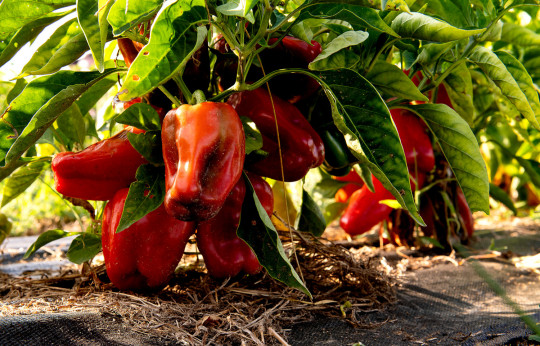
Illustration Photo: The Northwest Arkansas Crop Soil Health Program is aimed at helping farmers in Washington, Benton, Carroll and Madison counties sustain the productivity of their soils to support local food systems (credits: UA System Division of Agriculture photo by Fred Miller / Flickr Creative Commons Attribution-ShareAlike 2.0 Generic (CC BY-SA 2.0))
Young African Agrifood Changemakers
Are you a young farmer or agripreneur in Africa who is introducing new technologies or approaches to tackle climate change, food loss and waste, or malnutrition? Are you a community organizer or a policy advocate who is creating inclusive space for people to access sufficient, healthy food? Are you a changemaker working towards fairer and more sustainable agrifood systems?
The World Food Forum (WFF) Africa team is calling for nomination of young African changemakers who are striving to make our agrifood systems fairer and more sustainable and who can share their strong visions, recount their actions and inspire others to follow.
Eligibility
Applicants should be younger than 35 years old; Identifies as African or is someone actively working to change agrifood systems in Africa; Has their own vision of how to change Africa’s agrifood systems; Has been taking concrete actions in accordance with her/his vision; Supports the vision and goals of WFF; Is eager to inspire others by sharing their visions and experiences.
Nomination
One can nominate her/himself or others she/he knows well. The WFF Africa team will reach out to selected candidates in the order applications are received. Applications will be accepted until July 31, 2022.
Check more https://adalidda.com/posts/4cEjQSAHM9naPxEFf/young-african-agrifood-changemakers/call
0 notes
Photo

Illustration Photo: Pineapple farm and rural village in Lao PDR (credits: © ILO/Adri Berger / Flickr Creative Commons Attribution-NonCommercial-NoDerivs 2.0 Generic (CC BY-NC-ND 2.0))
Pilot Demonstrations under the GMS Climate Change and Environmental Sustainability Program
The GMS Climate Change and Environmental Sustainability Program (CCESP) is now accepting demonstration applications for the program’s six priority themes:
climate and disaster resilience, low-carbon transitions, climate-smart landscapes, environmental quality through pollution control and sustainable waste management, digital technology for climate actions and environmental sustainability, and financing low-carbon and climate-resilient infrastructure and technology. Demonstrations are one of the main activities of the CCESP in order to help enhance climate resilience, green growth, and environmental quality in the GMS. The program plans to have 27 demonstrations relating to the different themes (such as demonstrations on gender-responsive community resilience projects, and on the circular economy, pollution control, and waste management, etc.). Each demonstration project will have a budget of $40,000.
Through these demonstrations, the CCESP plans to pilot climate action practices, innovative technologies, and financing instruments. These demonstrations could eventually be scaled up or lead to wider investments.
Who should submit? The proposals can be developed and submitted by any of the following entities:
Working Group on Environment (WGE) coordinators and relevant government departments and agencies Development partners Civil society organizations and community-based organizations Private sector Academia and research institutes
What are some examples of demonstration ideas? Below are some ideas from initial discussions with the WGE based on the six themes:
Climate and disaster resilience – gender-responsive community resilience projects (only) Low-carbon transitions – green freight; low-carbon agriculture; green energy technologies Climate-smart landscapes – transboundary landscape project; capacity building for rangers in protected areas Environmental quality through pollution control and sustainable waste management – air-water-soil-plastic pollution from agriculture and industry emissions/effluents/wastes, plastic pollution due to COVID-19 Digital technology for climate actions and environmental sustainability – application of blockchain technology for waste management; drone technology for forest management Financing low-carbon and climate-resilient infrastructure and technologies –demonstrations on innovative climate and disaster risk financing instruments; improving financial mechanisms for the natural resources and environment sector (e.g., nature-based solutions and climate-smart agriculture); financing the decarbonization of the transportation and energy sectors (e.g., demonstration on the use of emissions trading mechanisms and carbon credits)
Application Deadline: 1 July 2022
Check more https://adalidda.com/posts/vaXpomiBWpyFYNhXi/pilot-demonstrations-under-the-gms-climate-change-and/call
0 notes
Photo

Illustration Photo: The community made this forest honey as the main livelihood for them. They are aware for the existence of the forest that never stops giving life, especially puspa fluids that bees need. Thats why they become the forest guards in the upstream area. (credits: Donny Iqbal/CIFOR-ICRAF / Flickr Creative Commons Attribution-NonCommercial-NoDerivs 2.0 Generic (CC BY-NC-ND 2.0))
The PKF Foundation Grants to support Grassroots Conservation, Land and Resource rights in the Local Communities in Developing Countries
The projects may concern less favoured communities and engage them in a process of solidarity to improve their living conditions, their environment and their rights. They may also attack the social conditions which bring about or perpetuate the lack of solidarity within or between communities. Or again, these projects may concern “non-material” communities centered with solidarity around defending a common good or issue, if this action is relevant to the Foundation’s objectives.
Selection criteria The Board chooses the initiatives to be supported by the Foundation, on the basis of expected results and in accordance with the Foundation’s objectives. The quality of the projects, the innovative character of their approach and their feasability are another essential criterion of choice. For example, the Board will give preference to
initiatives expected to yield a substantial improvement towards the desired objectives; exemplary initiatives which are capable to inspire and to motivate other people; initiatives capable of reinforcing or generating the solidarity of the communities concerned; initiatives which, with a small initial impulse, are liable to generate other initiatives and/or render themselves sustainable; initiatives which do not receive any other support because of their pioneering nature; initiatives which are based on plausible working hypotheses, and are carrried by actors capable of realizing them.
Maximum grant: 10,000 CHF for one or two years.
Application Deadline: No deadline.
Check more https://adalidda.com/posts/PAJyKcrKn77w4bjAD/the-pkf-foundation-grants-to-support-grassroots-conservation/call
0 notes
Photo

Illustration Photo: iFland SK Metaverse (credits: HS You / Flickr Creative Commons Attribution-NoDerivs 2.0 Generic (CC BY-ND 2.0))
Huawei Spark Ignite 2022
Huawei Spark Ignite 2022 is back! Bigger and better, this year’s edition is calling for a new batch of startups who DARE TO EXCEED the boundaries of their perceived limits by partnering Huawei to help startups realise their ambitions and exceed their potential.
This year, we're calling for ambitious growth startups, with existing commercially available products/services and who are not part of any existing Huawei program, to showcase your innovation to address one of the categories below and partner with a leading global brand.
In addition to USD 125K Cloud Credits and a grant prize of USD 40K, the Grand Winner will gain the opportunity to work with one of the world's leading technology innovators to bring their products and company onto another level, and onto a global platform. Up to 25 businesses are eligible for prizes, so there is plenty of room to make a tangible difference to your business future by joining Huawei Spark Ignite 2022.
Categories Enterprise Software
Fintech - FSI
Media & Gaming
Metaverse
Mobile Applications
Sustainability
Application Deadline: August 7, 2022
Check more https://adalidda.com/posts/BFGWpAFNtNAGo4tTX/huawei-spark-ignite-2022/call
0 notes
Photo

Illustration Photo: The community showing coffee from Punik Village, Batulanteh District, Sumbawa Regency. Since a few years ago, Sumbawa known as a producer specialty coffee. The unique taste of Punik coffee due to growth in agroforestry area that has potential ecotourism. The unique taste of Punik coffee become the complement of ecotourism in Batu Dulang Village. (credits: Donny Iqbal/CIFOR-ICRAF / Flickr Creative Commons Attribution-NonCommercial-NoDerivs 2.0 Generic (CC BY-NC-ND 2.0))
The Global Good Fund Fellowship for Innovators, Entrepreneurs, and Leaders of Positive Social Impact organizations
The Global Good Fund Fellowship is a 12-month program supporting the leadership development of social enterprise leaders across the globe. The Global Good Fund develops each innovator by pairing them with professional executive coach and c-suite business executive who serves as a mentor, and by providing leadership assessment resources, a network of peers, sector expertise, and targeted financial capital.
We invest in leaders who invest in the world. Those who dedicate each and every day to helping others, who sometimes forget to prioritize themselves along the way. We want a relationship. We want social entrepreneurs who not only want us, but need us. That’s why we have such an intensive application process.
Our program is specifically designed to develop the leadership skills of social entrepreneurs around the world. So, what does this mean? How do you know if this program is right for you?
Eligibility for Entrepreneurs:
+ Enterprise that the candidate leads is at least two years old; + Enterprise must have at least one full-time employee in addition to the candidate; + Candidate is committed full‐time to running his/her enterprise; + Candidate is under 40 years of age (if 40 or older, explain rationale for joining fellowship); + Candidates should not be currently receiving formal coaching/mentoring support;if they are applying for other fellowships within the 2022 fellowship cycle, please make sure it is indicated within your application. + Candidate has to be in a position where s/he has decision making power.
Eligibility for Organizations:
+ Organization can be a for profit, non-profit or hybrid. + Organization can be international, domestic or both. + Can be a for-profit, hybrid, or undecided venture, as long as the core mission is to create measurable social change. + The Global Good Fund fellowship is primarily focused on selecting enterprises in the following sectors: Financial Technology, Environment, Education, Economic Mobility and Health however we will consider applicants who fall outside of these areas as related to their potential for social impact and systematic change. + Organization has a set and sound business model with the ability to scale in the long term.
Application Deadline: June 30, 2022
Check more https://adalidda.com/posts/sZqyFm2QNbxo3r4p5/the-global-good-fund-fellowship-for-innovators-entrepreneurs/call
0 notes
Photo

Illustration Photo: Appliance to grow vegetable at home (credits: LG전자 / Flickr Creative Commons Attribution 2.0 Generic (CC BY 2.0))
Microsoft Climate Innovation Fund for Emerging climate technology solutions that have Early Commercial Traction
We will focus our funding on investments primarily based on four criteria:
Climate impact Meaningful, measurable climate solutions in the areas of carbon, water, waste, and ecosystems.
Underfunded markets Investing where the capital need for climate solutions is not being met.
Shared alignment Technologies that are relevant to Microsoft’s core business and that of our customers.
Climate equity Ensuring developing economies and underserved communities benefit from climate solutions.
We’ll focus on areas such as direct carbon removal, digital optimization, advanced energy systems, industrial materials, circular economy, water technologies, sustainable agriculture, and business strategies for nature-based markets.
The primary focus of the Microsoft Climate Innovation Fund is to:
Invest in emerging climate technology solutions that have early commercial traction and need capital to scale in the market Provide project financing to bring existing climate solutions to scale Invest directly in companies, with opportunities to: Scale new innovative solutions in the market Demonstrate the viability of new technologies Partner with other investors to meet the world’s climate objectives The Microsoft Climate Innovation Fund does not have a mandate to:
Provide grants or donations Lead an investment round Take a majority ownership stake in a fund or company Fund publicly traded companies
Application Deadline: No deadline. You can apply anytime.
Check more https://adalidda.com/posts/5E8TAy525YmAKh2kG/microsoft-climate-innovation-fund-for-emerging-climate/call
0 notes
Photo
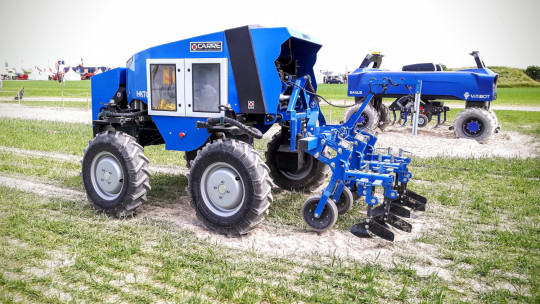
Illustration Photo: Agricultural robot blues. Anatis by Carré and Vitibot at Les Culturales, Bétheny, France (credits: Davide Rizzo / Flickr Creative Commons Attribution 2.0 Generic (CC BY 2.0))
Queen Elizabeth Prize for Engineering
The Queen Elizabeth Prize for Engineering (QEPrize) champions bold, groundbreaking engineering innovation which is of global benefit to humanity.
The world’s leading award for engineers and engineering, the annual £500,000 prize promotes excellence in engineering and celebrates engineering’s visionaries. It inspires young minds to consider engineering as a career choice, and it encourages engineers to push the boundaries of what is possible.
Diverse, multifaceted, and continually evolving, engineering helps create solutions to global challenges and improves billions of lives. Engineers have enabled us to work together across the planet, explore the smallest cells and the most distant stars, and navigate our way through the world.
Eligibility
Entry to the Prize is open to:
any living individual (or not more than five living individuals working as a team); of any nationality; who is personally responsible for a ground-breaking innovation in engineering which has been of global benefit to humanity. Self-nomination is not permitted. The Trustees reserve the right to reject any nomination where, in their reasonable opinion, there is or is likely to be a conflict of interest between the nominees, nominators or any referees and any other nomination or the Prize more generally.
Application Deadline: 15 July 2022
Check more https://adalidda.com/posts/SbfkC4T8u9x3Cpqsr/queen-elizabeth-prize-for-engineering/call
0 notes
Photo

Illustration Photo: A CIMMYT field worker demonstrates the emasculation of a wheat spike (credits: CIMMYT / Alfonso Cortés / Flickr Creative Commons Attribution-NonCommercial-ShareAlike 2.0 Generic (CC BY-NC-SA 2.0))
The Benefit-sharing Fund to support Projects that leverage Plant genetic resources
Plant genetic resources for food and agriculture make an essential contribution to increasing and safeguarding food security and nutrition, improving rural livelihoods and economies and to meeting the challenges of adapting to climate change. However, we are losing this biodiversity at an alarming rate.
Established by the International Treaty’s Governing Body in 2009 and under its direct control, the Benefit-sharing Fund supports projects that leverage plant genetic resources to find solutions for complex challenges relating to food and nutrition insecurity, biodiversity loss and climate change.
The Fund enables small-scale farmers, scientists and breeders to tap into the Treaty’s global genepool of millions of different genetic materials to undertake research and develop crop varieties that are more resilient, more productive and nutritious.
So far, it has supported four project cycles with 80 projects funded around the world and in collaboration with over 500 organizations. The primary beneficiaries of the Benefit-sharing Fund are farmers, especially in developing countries who conserve and sustainably utilize plant genetic resources for food and agriculture.
Through helping farmers at local level to find solutions to climate change and other challenges, the Treaty system for agricultural diversity is strengthened. The fifth cycle of the Benefit-sharing Fund (BSF-5) will transcend the divide that is often seen between on-farm, in situ and ex situ conservation, and demonstrate how different initiatives from farming communities through national and international genebanks are linked together through the International Treaty. The programme will aim at creating a network of initiatives led by farming communities that are actively managing plant genetic diversity in centers of origin of crops, areas of food insecurity or affected by climate change.
Knowledge, information and germplasm generated through the Benefit-sharing Fund will feed back into the Treaty enabling mechanisms, expanding the resources available all over the world to improve food security and sustainable agriculture. BSF-5 will develop a strong knowledge-sharing mechanism to improve farmers’ access to plant genetic material and its related-data, as well as technical tools that help strengthen national and regional planning to Treaty implementation.
Through multiple partnerships, BSF-5 will benefit a wide range of stakeholders, including policymakers, genebank curators, breeders, researchers, students and academia.
Application Deadline: 29 July 2022, 23.59 CEST
Check more https://adalidda.com/posts/wf8A5EwWWjDSSQEw2/the-benefit-sharing-fund-to-support-projects-that-leverage/call
0 notes
Photo

Illustration Photo: Garden Gourmet Vrimp is a plant-based alternative to shrimp (credits: Nestlé / Flickr Creative Commons Attribution-NonCommercial-NoDerivs 2.0 Generic (CC BY-NC-ND 2.0))
ProVeg Incubator for Plant-based and Cultured Food Startups
ProVeg Incubator is the world’s leading Incubator of plant-based and cultured food startups. We are shaping the future of food by supporting pioneering companies that are developing disruptive alternatives to animal-based products, ingredients, and services.
Startups that join the ProVeg Incubator could receive up to €250,000 in funding (incl. €50,000 in-kind services). The investment terms are based on our evaluation framework and will be agreed upon before startups join the programme.
What you get
Accelerator programme: Equip yourself with the skills, knowledge, and contacts you need to succeed.
Expert mentoring: Learn from the pros. We’ll match you with a personal business advisor.
Funding: Get up to €250,000 in funding to build the company you want.
Industry networks: Connect with investors, retailers, scientists, journalists, and other experts from our global networks.
Alumni community: Join a lifelong, collaborative community of likeminded startup founders.
Facilities: Use our co-working space, test kitchen, and event space in the heart of Berlin.
Application Deadline: 31 July 2022
Check more https://adalidda.com/posts/wvaPX7e6eLXXNF4tg/proveg-incubator-for-plant-based-and-cultured-food-startups/call
0 notes
Photo

Illustration Photo: The community harvesting ketak (Lygodium Circinatun) in Batudulang Village, Batu Lateh District, Sumbawa Regency, West Nusa Tenggara. Now, that fern plant becomes the economic creative as additional incomes for the community. (credits: Donny Iqbal/CIFOR-ICRAF / Flickr Creative Commons Attribution-NonCommercial-NoDerivs 2.0 Generic (CC BY-NC-ND 2.0))
The Catalyst Fund for Small and/or Early-stage Ideas and Projects
The Catalyst Fund is geared towards small and/or early-stage ideas and projects that need a capital infusion to launch or prove viability. Catalyst awardees are typically piloting a program, venturing into new territory, on the cusp of launching, or pivoting in a new direction.
Criteria
We are looking for well-thought-out projects that have a high potential for lasting impact.
We know you are applying with an early-stage idea. However, we’re looking for a well-thought-out plan with clear goals, specific metrics, and measurable impact. We’re also looking for:
Innovative: Approaches or strategies that innovate on existing models — What are you building on? What other solutions already exist? Community-based: You have a deep understanding of the communities you work on behalf of — What are their needs? How are they engaged in the process? How will they be able to maintain the solution over time? High potential for impact: A recognized issue that affects a significant percentage of people — this is relative, but we’re looking for solutions to problems that have outsized impact. Sustainable: Experienced team and a smart strategy for driving change — Who and what are driving the change? Why is this the right team? What makes this the right strategic bet right now? The selection process also takes into consideration the following criteria: innovation, potential impact, eco-system, and originality.
Eligibility
Catalyst supports projects from anywhere in the world by individuals, teams, non-profits, or social enterprises.
The Catalyst Fund has been created to source ideas from all corners of the globe. You can be a seasoned social entrepreneur or a first-time changemaker. Eligible candidates for the Catalyst Fund may be individuals, teams of individuals, non-profit organizations, or social enterprises. To be eligible, all applicants must:
Be 18 years of age or older Submit an application in English Include completed responses to all required application questions Agree to all legal terms and conditions of the Catalyst Fund grant program Be able to legally receive grant funding
What are the sizes of Catalyst grants (i.e. how much should we request)?
Requests submitted through the Catalyst Fund range from $2,500 to $15,000. Requests above $15k will be automatically disqualified. Please align your request with what you need — if you need $7k, don’t ask for $12k. In deciding how much to request, consider how much funding you need right now and how you will use it to advance your idea.
Application Deadline: No deadline. You can apply anytime.
Check more https://adalidda.com/posts/KFGWzXo2pjrX4BKms/the-catalyst-fund-for-small-and-or-early-stage-ideas-and/call
0 notes
Photo

Illustration Photo: Dieudonné Botea's rice field being harvested in Ngazi - Congo DRC (credits: Axel Fassio/CIFOR-ICRAF / Flickr Creative Commons Attribution-NonCommercial-NoDerivs 2.0 Generic (CC BY-NC-ND 2.0))
P4G State-of-the-Art Partnerships Awards
P4G is looking for the world's most innovative partnerships delivering measurable sustainable growth and climate action impact. Our State-of-the-Art Partnerships are best-in-class examples of multistakeholder partnerships that can rapidly scale and replicate their models of change. We welcome the most entrepreneurial solutions capable of delivering transformative impact in this decade of action.
SDG 2 Food and Agriculture: BetterCycle converts organic waste into insect protein thus reducing waste and preserving wild fish populations in the ocean.
SDG 6 Clean Water and Sanitation: Netherlands Water Partnership (NWP) and Kenya Innovative Finance Facility for Water (KIFFWA) Partnership provides early-stage capital and expertise to Kenyan entrepreneurs to develop viable water initiatives and attract private investors.
SDG 7 Affordable and Clean Energy: CFI2030 Jeju transforms the city of Jeju into a net-zero hub utilizing state-of-the-art technology including renewable energy, electric vehicles, smart grids and microgrids.
SDG 11 Sustainable Cities and Communities: Sociedad Hipotecaria Federal (SHF) Sustainable Portfolio expands energy efficient homes in Mexico by providing financial incentives and technical assistance to encourage developers to build sustainable homes.
SDG 12 Responsible Consumption and Production: Closing the Loop on Textile Waste in Kenya, the 2021 Partnership of the Year, reduces waste by regenerating fabric waste into virgin-quality fiber for use in textile production
JUDGES WILL CHOOSE WINNERS BASED ON THE FOLLOWING CRITERIA:
Eligibility—Address one or more of P4G’s five targeted SDGs. The partnership includes at least one commercial and one civil society partner.
Impact—Partnership has demonstrated measurable and verifiable outcomes.
Innovation—Partnership has developed innovative and commercially-viable solutions to address its target SDG.
Scalability—Partnership has grown since its launch and has demonstrated the ability to be replicated in other markets.
Financial Sustainability—Partnership implements market-based solutions that have already or will attract a level of commercial investment and/or support.
Application Deadline: July 31, 2022
Check more https://adalidda.com/posts/sBYjut7Tyopz5Zg4z/p4g-state-of-the-art-partnerships-awards/call
0 notes
Photo

Illustration Photo: A flow tower for measuring the level of greenhouse gases (CO2, N2O and CH4) for a better understanding the contribution of tropical forests to climate change mitigation. Yangambi - Congo DRC. (credits: Axel Fassio/CIFOR / Flickr Creative Commons Attribution-NonCommercial-NoDerivs 2.0 Generic (CC BY-NC-ND 2.0))
2022 Africa Digital Innovation Competition
As part of the 2022 Digital Economy Summit, the U.S. Chamber of Commerce’s U.S.-Africa Business Center (USAfBC) in conjunction with AmChams across Africa, is hosting its annual Digital Innovation Competition for African Startups. The competition is targeted towards Digital SMEs and startups that are looking to facilitate the delivery of digital, cross-border, interoperable, and cross-domain services, and solutions, while also accelerating their digitally enabled growth.
The Digital Innovation Competition will award innovators, entrepreneurs, and startups for developing solutions through digital products and services while creating a positive impact on African citizens. This competition seeks to promote talent in the African region through social impact, digital initiatives that incorporate cutting-edge technologies, innovation, and creativity in the form of proposals that formulate solutions to different problems and opportunities in the region.
The competition will be focused on three broad thematic areas:
Fintech and Cyber Solutions: covering data flow solutions, cross border digital platform solutions, mobile technology, intellectual property management, cyber security, and digital movement of creative art (movies, music, art). Sustainability & Supply Chain Solutions: covering smart manufacturing, e-commerce, management of shared economies, improvement to digital supply chain, logistics solutions to e-commerce businesses, and Agriculture technology (AgTech). Human Development & Social Services Solutions: covering digital health solutions, e-learning platform.
Eligibility criteria
To be eligible for the Competition, a startup must be a registered business with at least 51% African ownership, headquartered in an African country, and have no government affiliation.
Application Deadline: 11.59 EDT, June 30, 2022
Check more https://adalidda.com/posts/qPgReNQ5BdhgvcFaL/2022-africa-digital-innovation-competition/call
0 notes
Photo
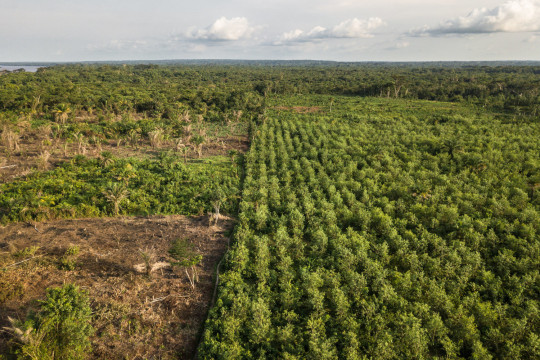
Illustration Photo: Forest plantations, Comboni plot in Yanonge - Congo DRC (credits: Axel Fassio/CIFOR-ICRAF / Flickr Creative Commons Attribution-NonCommercial-NoDerivs 2.0 Generic (CC BY-NC-ND 2.0))
XPRIZE Carbon Removal
XPRIZE Carbon Removal is aimed at tackling the biggest threat facing humanity - fighting climate change and rebalancing Earth’s carbon cycle. Funded by Elon Musk and the Musk Foundation, this $100M competition is the largest incentive prize in history, an extraordinary milestone.
The climate math is becoming clear that we will need gigaton-scale carbon removal in the coming decades to avoid the worst effects of climate change. The International Panel on Climate Change (IPCC) estimates the need at approximately 10 gigatonnes of net CO2 removal per year by the year 2050 in order to keep global temperature rise under 1.5 or 2C. As governments, companies, investors, and entrepreneurs make plans to meet this challenge, it is clear that we will need a range of carbon removal solutions to be proven through demonstration and deployment to complement work that is already underway. If humanity continues on a business-as-usual path, the global average temperature could increase 6˚(C) by the year 2100.
This four-year global competition invites innovators and teams from anywhere on the planet to create and demonstrate solutions that can pull carbon dioxide directly from the atmosphere or oceans, and sequester it durably and sustainably. To win the grand prize, teams must demonstrate a working solution at a scale of at least 1000 tonnes removed per year; model their costs at a scale of 1 million tonnes per year; and show a pathway to achieving a scale of gigatonnes per year in future.
Any carbon negative solution is eligible: nature-based, direct air capture, oceans, mineralization, or anything else that achieves net negative emissions, sequesters CO2 durably, and show a sustainable path to achieving low cost at gigatonne scale.
PRIZE PURSE
The $100M prize purse will be distributed as follows:
After 1 year of competition the judges will review all submissions received by that time and award up to 15 Milestone Prizes of $1 million each. At the discretion of the judges, these awards may be granted on a conditional basis, subject to the team’s demonstrated commitment to continuing to develop and advance their solutions and to compete for the Grand Prize.
After 4 years, judges will select the winners:
Bullet point $50 million paid to the single Grand Prize Winner
Bullet point $30 million to be distributed among up to 3 runners up
XPRIZE will also award up to US$5M to student teams in the Fall of 2021. These awards may fund participation in the XPRIZE Carbon Removal or the development of key supportive technologies.
Application Deadline: April 22, 2025
Check more https://adalidda.com/posts/B99sBd8knySamcH9k/xprize-carbon-removal/call
0 notes
Photo
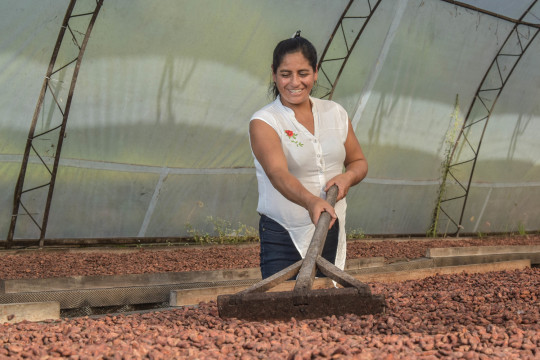
Illustration Photo: Woman entrepreneur in Latin America (credits: / Flickr Creative Commons Attribution-NonCommercial-NoDerivs 2.0 Generic (CC BY-NC-ND 2.0))
The Cartier Women's Initiative to drive change by Empowering Women Impact Entrepreneurs
To celebrate the 15th anniversary of the Cartier Women’s Initiative, nine former fellows have been selected for the extraordinary impact that their businesses have achieved over the years.
The Impact Awards cover three categories: Improving Lives, Preserving the Planet, and Creating Opportunities, which are based on the United Nations Sustainable Development Goals (UN SDGs). Three former fellows are recognized in each of the three categories. The first-place, second-place, and third-place awardees were announced on March 6, 2022, during the Impact Awards Ceremony in Dubai.
Meet these bold entrepreneurs who are leveraging business to protect the Earth's environment, improve livelihoods in their communities, and create opportunities for a better future.
Eligibility
Benefits
The 21 finalists, representing the top 3 businesses from each of the 7 regions, will receive: One-to-one personalized business coaching prior to the Awards week;
A series of business coaching workshops and networking sessions during the Awards week;
Media visibility for the finalists and their businesses in the months leading up to the Awards week and interview opportunities with local & international press during the Awards week.
Prizes
The 7 laureates (1 from each region) will receive:
US$ 100 000 in prize money The 14 finalists (the two runners-up from each region) will receive:
US$ 30 000 in prize money Awards Package
In addition to the prize money, all 21 finalists will be awarded:
A scholarship to attend the six-day INSEAD Social Entrepreneurship Executive Education Programme (pending admission to the programme based on eligibility criteria and selection process);
Ongoing support for the further growth and development of their business.
Application Deadline: June 30, 2022 at 2 PM
Check more https://adalidda.com/posts/LnyjbyQPChksoTa95/the-cartier-women-s-initiative-to-drive-change-by-empowering/call
0 notes